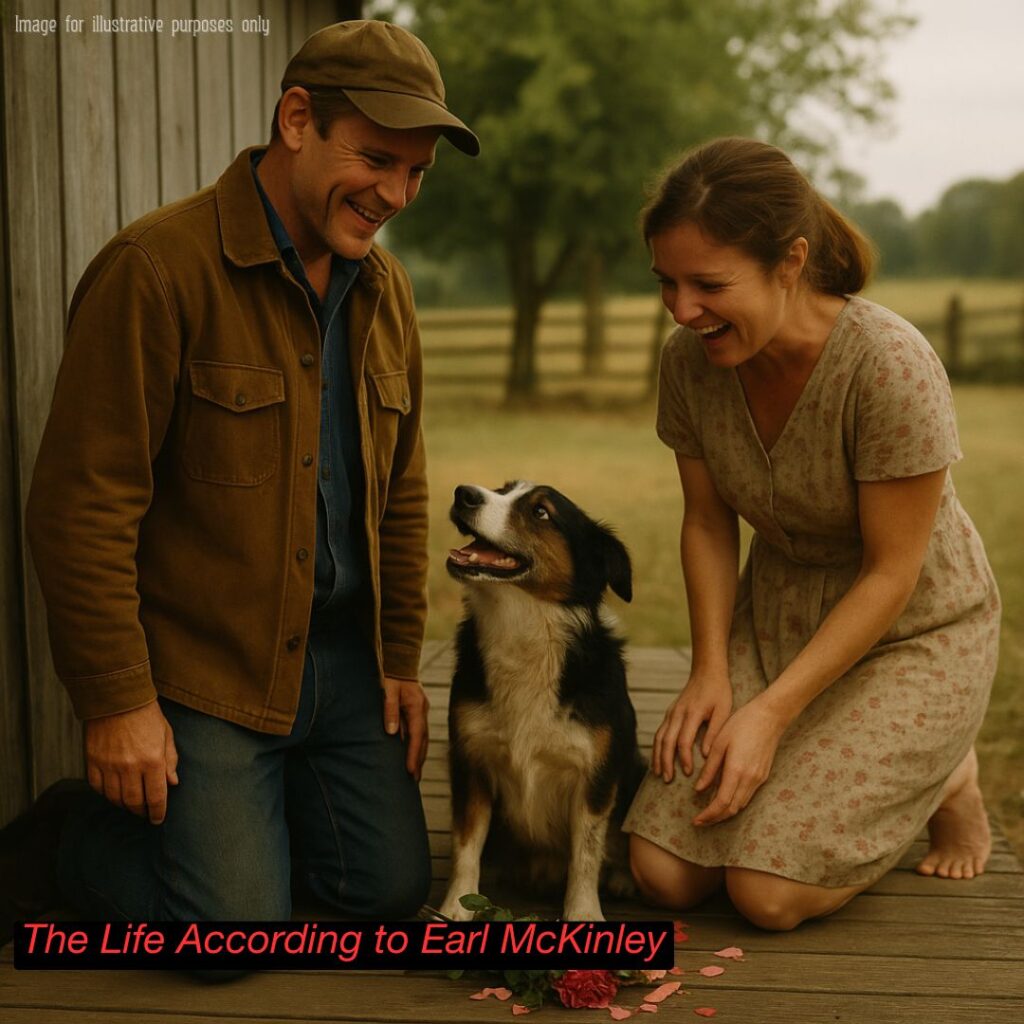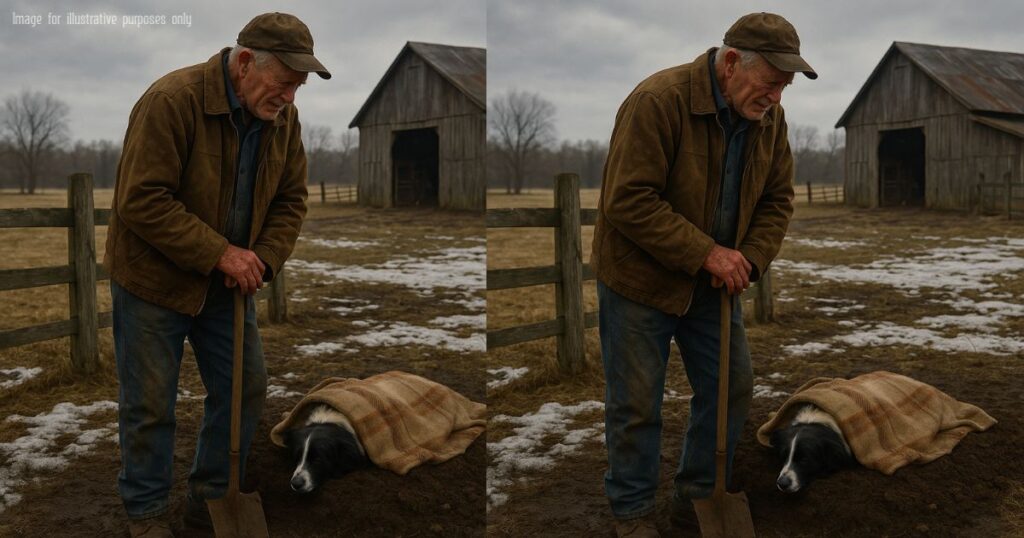Part 3 — Red (1978–1989)

The dog had one ear that wouldn’t stand up, a tail that never stopped wagging, and a habit of making Earl believe the world still had good days left in it.
They weren’t planning on keeping another dog.
Not after Daisy.
Earl had told himself that losing her was a one-time kind of pain — the sort you learned from. Like putting your hand on a hot stove when you’re a kid. You didn’t do it twice.
But then came Red.
He showed up one wet spring evening in ’78, dragging his back leg and howling like he’d never known a soft place to land. Earl spotted him from the porch, limping across the field, soaked to the bone and eyes wild with hunger.
Carol had opened the screen door before Earl could say a word.
“Get the old blanket,” she said. “And the ham. Not the canned kind.”
That was Carol. Tough as nails with people. Soft as warm bread with strays.
Red wasn’t much to look at. Not like Daisy had been — sleek and sharp, built like a shadow. Red was a mutt in a Border Collie coat. Big ears, one flopped sideways. Fur that stuck out wrong. His ribs showed. His tail wagged even when he was too weak to stand.
But he had heart. God, did he have heart.
They named him Red because of the rust-colored patches behind his ears. And because, in a strange way, he reminded Earl of the dirt out back after a hard rain — stubborn, messy, but full of life.
That summer was one of the good ones.
The kind you only recognize in hindsight — not too hot, not too dry. Corn high. Hay sweet. Carol laughing more than usual. Earl felt strong. The kind of strong that comes from a rhythm — work, sweat, supper, sleep. And Red fell into that rhythm like he’d been born to it.
He followed Earl everywhere.
Didn’t herd much. Didn’t need to. He was more companion than worker. Would sit beside the fence as Earl repaired wire. Ride in the truck bed into town, ears flapping, tongue lolling like a drunk uncle.
“Ugliest damn dog I’ve ever seen,” the old men at the feed store would say.
“Yeah,” Earl would nod, “but he’s mine.”
What Red lacked in skill, he made up for in loyalty.
When Carol had her surgery in ’81, Earl came home from the hospital bone-tired and brittle. He hadn’t cried — not once — not even when the doctor said the word “tumor” like it was just another thing to shovel out of the way.
That night, Red curled up at the foot of the bed and didn’t move once. Not even to eat. Just stayed there, ears twitching at every creak of the floorboard, waiting like he could hold the world steady if he just lay still enough.
Carol pulled through. Tough as she was.
But Earl never forgot that night.
Red had his quirks.
He hated thunderstorms — would whine and shake and wedge himself under the table like a scared child. Wouldn’t eat green beans. Wouldn’t go near the old scarecrow Earl had put up one fall. And he had a sixth sense for mailmen — loved the one on Tuesdays, growled at the one on Fridays.
But his favorite ritual was walking Carol to the mailbox.
Every afternoon like clockwork, he’d stand at the back door, tail thumping, waiting for her to grab the letter opener from the windowsill. Then he’d trot beside her, head high, like he was escorting royalty down a red carpet of gravel.
Neighbors smiled when they saw it.
“One day,” Carol joked, “he’s going to bring me flowers.”
And one day, he did.
Sort of.
Earl found him in the yard with a torn-up bouquet from Mrs. Langley’s garden three fences over, petals drooping, thorns still attached. He dragged them to the porch and dropped them at Carol’s feet like a trophy.
She laughed until she cried.
They kept the best of those roses pressed between book pages. Carol swore they still smelled like summer years later.
By ’88, Red had gone mostly gray around the muzzle. Moved a little slower. Slept a little deeper. But the spirit — that stubborn, tail-wagging heart — never quit.
When the tractor flipped on the north slope — a quick job gone wrong — it was Red who raised hell loud enough for old Mr. Collier to come running. Earl had a dislocated shoulder and a bruised ego, but he was alive. Mostly thanks to a dog who barely barked unless it mattered.
That winter, the snow came early.
Carol baked more. Earl shoveled more. Red curled by the stove and twitched in his sleep, chasing rabbits he’d never catch again.
One morning, Earl found him lying by the porch steps, nose in the wind, eyes open but unseeing. Peaceful. As if he’d just closed his chapter quietly, no fuss, no big farewell.
They buried him beside Daisy, near the west fence. Wrapped him in Carol’s old quilt.
Earl carved the plaque slow, hands stiffer now than when he’d done it the first time.
Red — 1978–1989
One ear down. Tail always up.
Taught me joy didn’t need a purpose.
Years later, after the fields had emptied and the fences leaned with age, Earl would sit on the porch, look out over the land, and think about Red.
Not about his death. But about the life he helped fill — not with achievements or duties, but with moments.
Small ones.
The sound of paws on floorboards. A nose nudging a hand during storms. The laughter of a woman opening a box of ruined roses.
In a world that keeps asking you to work harder, prove more, be better — Red was a quiet kind of wisdom.
He reminded Earl that joy didn’t need a reason.
It just needed a place to belong.
🪵
Sometimes, the ones who give us the most never bring anything but their presence. And sometimes, that’s the very thing we needed most.


